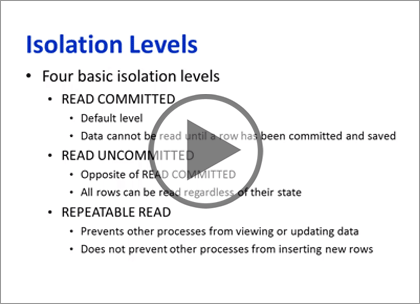Course description
When you retrieve data with a SELECT statement, SQL returns a result set. However, any actions you take on that data (besides just looking at it) involve data manipulation queries that use one of the following three T-SQL statements: INSERT, UPDATE, or DELETE. SQL queries that use these statements are sometimes known as action queries. You’ll learn about the basic uses of these statements. When you modify data in SQL Server, it is important to understand how isolation levels and locking can affect performance and concurrency. You’ll learn about these concepts and how they can affect T-SQL code you write, as well as mitigating measures you can take to avoid problems.
Prerequisites
This course assumes that you have at least a basic familiarity with the concept of relational databases and a basic understanding of what SQL Server is and the high-level tools in it, as well as how to create and manage objects using Management Studio. You should also have a basic understanding of how SQL Server implements security, including its authentication and authorization schemes, and how to assign permissions on securable objects to principals. You should have viewed SQL Server 2014: T-SQL Select, Where, Clauses, and Tables before viewing this course.
Learning Paths
This course will help you prepare for the following certifications and exams:
MCSE: Business Intelligence
MCSA: SQL Server 2012/2014
MCSE: Data Platform
70-461: Querying Microsoft SQL Server 2012/2014
This course is part of the following LearnNowOnline SuccessPaths™:
SQL Server Core
Meet the expert
Don Kiely is a featured instructor on many of our SQL Server and Visual Studio courses. He is a nationally recognized author, instructor, and consultant specializing in Microsoft technologies. Don has many years of teaching experience, is the author or co-author of several programming books, and has spoken at many industry conferences and user groups. In addition, Don is a consultant for a variety of companies that develop distributed applications for public and private organizations.
Course outline
Working with Data
Inserting Data (22:46)
- Introduction (01:53)
- Inserting Data (00:40)
- Demo: Column Data Types (01:06)
- Demo: INSERT (04:29)
- Demo: NOCOUNT (01:39)
- Retrieving Identity Values (01:12)
- Demo: Identity Values (01:10)
- Demo: Inserting Quotes (03:11)
- Demo: Inserting Multiple Rows (04:07)
- Demo: Row Constructor (01:43)
- Demo: SELECT INTO (01:03)
- Summary (00:28)
Temp Tables, Output, Bulk Copy (13:05)
- Introduction (01:10)
- Demo: Temp Tables (01:57)
- Uses for Temp Tables (01:17)
- Global Temp Tables (00:34)
- Demo: Global Temp Tables (01:03)
- Inserting With OUTPUT (00:33)
- Demo: Inserting With OUTPUT (02:20)
- Using Bulk Copy to Insert Data (00:44)
- Demo: BULK INSERT statement (02:39)
- Summary (00:45)
Updating and Deleting Data (16:47)
- Introduction (00:44)
- Updating Data (00:50)
- Demo: Updating Data (03:28)
- Demo: Dynamic Updates (02:23)
- Demo: Updating Large Values (02:42)
- Demo: CHARINDEX (02:33)
- Deleting Data (00:41)
- Demo: Deleting Data (01:16)
- Demo: TRUNCATE (01:20)
- Summary (00:45)
Understanding Transactions (26:12)
- Introduction (01:32)
- Isolation Levels (05:24)
- Blocking and Deadlocks (01:22)
- Deadlocks (02:27)
- Deadlock Resolution (01:05)
- Demo: Deadlock (03:45)
- Demo: Deadlock Resolution (01:48)
- Using Snapshot Isolation (02:34)
- Snapshot Isolation Caveats (00:57)
- Demo: Snapshot Isolation (04:20)
- Summary (00:54)



